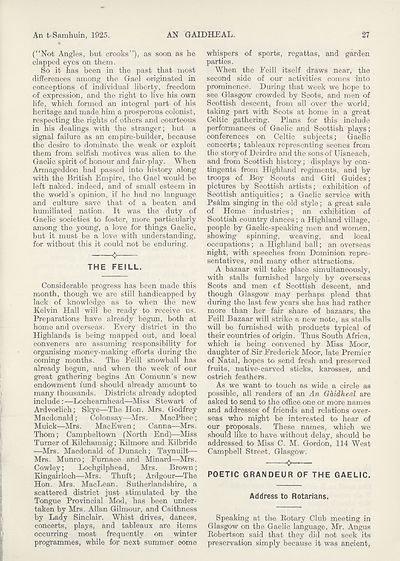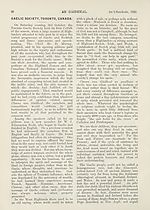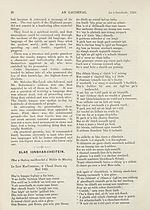An Comunn Gàidhealach Publications > Gaidheal > Volume 21, October 1925--September 1926
(35) Page 27
Download files
Complete book:
Individual page:
Thumbnail gallery: Grid view | List view

An t-Samhuin, 1925.
AN GAIDHEAL.
27
(“Not Angles, but crooks”), as soon as he
clapped eyes on them.
So it has been in the past that most
differences among the Gael originated in
conceptions of individual liberty, freedom
of expression, and the right to live his own
life, which formed an integral part of his
heritage and made him a prosperous colonist,
respecting the rights of others and courteous
in his dealings with the stranger; but a
signal failure as an empire-builder, because
the desire to dominate the weak or exploit
them from selfish motives was alien to the
Gaelic spirit of honour and fair-play. When
Armageddon had passed into history along
with the British Empire, the Gael would be
left naked, indeed, and of small esteem in
the world’s opinion, if he had no language
and culture save that of a beaten and
humiliated nation. It was the duty of
Gaelic societies to foster, more particularly
among the young, a, love for things Gaelic,
but it must be a love with understanding,
for without this it could not be enduring.
THE FEILL.
Considerable progress has been made this
month, though we are still handicapped by
lack of knowledge as to when the new
Kelvin Hall will be ready to receive us.
Preparations have already begun, both at
home and overseas. Every district in the
Highlands is being mapped out, and local
conveners are assuming responsibility for
organising money-making efforts during the
coming months. The Eeill snowball has
already begun, and when the week of our
great gathering begins An Comunn’s new
endowment fund should already amount to
many thousands. Districts already adopted
include : —Locheamhead—Miss Stewart of
Ardvorlich; Skye—The Hon. Mrs. Godfrey
Macdonald; Colonsay—Mrs. MacPhee;
Muick—Mrs. MacEwen; Canna—Mrs.
Thom; Campbeltown (North End)—Miss
Turner of Kilchamaig; Kilmore and Kilbride
—Mrs. Macdonald of Dunach; Taynuilt—
Mrs. Munro; Furnace and Minard—Mrs.
Cowley; Lochgilphead, Mrs. Brown;
Kingairloch—Mrs. Thuft; Ardgour—The
Hon. Mrs. MacLean. Sutherlandshire, a
scattered district just stimulated by the
Tongue Provincial Mod, has been under¬
taken by Mrs. Allan Gilmour, and Caithness
by Lady Sinclair. Whist drives, dances,
concerts, plays, and tableaux are items
occurring most frequently on winter
programmes, while for next summer come
whispers of sports, regattas, and garden
parties.
When the Feill itself draws near, the
second side of our activities comes into
prominence. During that week we hope to
see Glasgow crowded by Scots, and men of
Scottish descent, from all over the world,
taking part with Scots at home in a great
Celtic gathering. Plans for this include
performances of Gaelic and Scottish plays;
conferences on Celtic subjects; Gaelic
concerts; tableaux representing scenes from
the story of Deirdre and the sons of Uisneach,
and from Scottish history; displays by con¬
tingents from Highland regiments, and by
troops of Boy Scouts and Girl Guides;
pictures by Scottish artists; exhibition of
Scottish antiquities; a Gaelic service with
Psalm singing in the old style; a great sale
of Home industries; an exhibition of
Scottish country dances; a Highland village,
people by Gaelic-speaking men and woman,
showing spinning, weaving, and local
occupations; a Highland ball; an overseas
night, with speeches from Dominion repre¬
sentatives, and many other attractions.
A bazaar will take place simultaneously,
with stalls furnished largely by overseas
Scots and men of Scottish descent, and
though Glasgow may perhaps plead that
during the last few years she has had rather
more than her fair share of bazaars, the
Feill Bazaar will strike a new note, as stalls
will be furnished with products typical of
their countries of origin. Thus South Africa,
which is being convened by Miss Moor,
daughter of Sir Frederick Moor, late Premier
of Natal, hopes to send fresh and preserved
fruits, native-carved sticks, karosses, and
ostrich feathers.
As we want to touch as wide a circle as
possible, all readers of an An Gaidheal are
asked to send to the office one or more names
and addresses of friends and relations over¬
seas who might be interested to hear of
our proposals. These names, which we
should like to have without delay, should be
addressed to Miss C. M. Gordon, 114 West
Campbell Street, Glasgow.
POETIC GRANDEUR OF THE GAELIC.
Address to Rotarians.
Speaking at the Rotary Club meeting in
Glasgow on the Gaelic language, Mr. Angus
Robertson said that they did not seek its
preservation simply because it was ancient,
AN GAIDHEAL.
27
(“Not Angles, but crooks”), as soon as he
clapped eyes on them.
So it has been in the past that most
differences among the Gael originated in
conceptions of individual liberty, freedom
of expression, and the right to live his own
life, which formed an integral part of his
heritage and made him a prosperous colonist,
respecting the rights of others and courteous
in his dealings with the stranger; but a
signal failure as an empire-builder, because
the desire to dominate the weak or exploit
them from selfish motives was alien to the
Gaelic spirit of honour and fair-play. When
Armageddon had passed into history along
with the British Empire, the Gael would be
left naked, indeed, and of small esteem in
the world’s opinion, if he had no language
and culture save that of a beaten and
humiliated nation. It was the duty of
Gaelic societies to foster, more particularly
among the young, a, love for things Gaelic,
but it must be a love with understanding,
for without this it could not be enduring.
THE FEILL.
Considerable progress has been made this
month, though we are still handicapped by
lack of knowledge as to when the new
Kelvin Hall will be ready to receive us.
Preparations have already begun, both at
home and overseas. Every district in the
Highlands is being mapped out, and local
conveners are assuming responsibility for
organising money-making efforts during the
coming months. The Eeill snowball has
already begun, and when the week of our
great gathering begins An Comunn’s new
endowment fund should already amount to
many thousands. Districts already adopted
include : —Locheamhead—Miss Stewart of
Ardvorlich; Skye—The Hon. Mrs. Godfrey
Macdonald; Colonsay—Mrs. MacPhee;
Muick—Mrs. MacEwen; Canna—Mrs.
Thom; Campbeltown (North End)—Miss
Turner of Kilchamaig; Kilmore and Kilbride
—Mrs. Macdonald of Dunach; Taynuilt—
Mrs. Munro; Furnace and Minard—Mrs.
Cowley; Lochgilphead, Mrs. Brown;
Kingairloch—Mrs. Thuft; Ardgour—The
Hon. Mrs. MacLean. Sutherlandshire, a
scattered district just stimulated by the
Tongue Provincial Mod, has been under¬
taken by Mrs. Allan Gilmour, and Caithness
by Lady Sinclair. Whist drives, dances,
concerts, plays, and tableaux are items
occurring most frequently on winter
programmes, while for next summer come
whispers of sports, regattas, and garden
parties.
When the Feill itself draws near, the
second side of our activities comes into
prominence. During that week we hope to
see Glasgow crowded by Scots, and men of
Scottish descent, from all over the world,
taking part with Scots at home in a great
Celtic gathering. Plans for this include
performances of Gaelic and Scottish plays;
conferences on Celtic subjects; Gaelic
concerts; tableaux representing scenes from
the story of Deirdre and the sons of Uisneach,
and from Scottish history; displays by con¬
tingents from Highland regiments, and by
troops of Boy Scouts and Girl Guides;
pictures by Scottish artists; exhibition of
Scottish antiquities; a Gaelic service with
Psalm singing in the old style; a great sale
of Home industries; an exhibition of
Scottish country dances; a Highland village,
people by Gaelic-speaking men and woman,
showing spinning, weaving, and local
occupations; a Highland ball; an overseas
night, with speeches from Dominion repre¬
sentatives, and many other attractions.
A bazaar will take place simultaneously,
with stalls furnished largely by overseas
Scots and men of Scottish descent, and
though Glasgow may perhaps plead that
during the last few years she has had rather
more than her fair share of bazaars, the
Feill Bazaar will strike a new note, as stalls
will be furnished with products typical of
their countries of origin. Thus South Africa,
which is being convened by Miss Moor,
daughter of Sir Frederick Moor, late Premier
of Natal, hopes to send fresh and preserved
fruits, native-carved sticks, karosses, and
ostrich feathers.
As we want to touch as wide a circle as
possible, all readers of an An Gaidheal are
asked to send to the office one or more names
and addresses of friends and relations over¬
seas who might be interested to hear of
our proposals. These names, which we
should like to have without delay, should be
addressed to Miss C. M. Gordon, 114 West
Campbell Street, Glasgow.
POETIC GRANDEUR OF THE GAELIC.
Address to Rotarians.
Speaking at the Rotary Club meeting in
Glasgow on the Gaelic language, Mr. Angus
Robertson said that they did not seek its
preservation simply because it was ancient,
Set display mode to:
![]() Universal Viewer |
Universal Viewer | ![]() Mirador |
Large image | Transcription
Mirador |
Large image | Transcription
| An Comunn Gàidhealach > An Comunn Gàidhealach Publications > Gaidheal > Volume 21, October 1925--September 1926 > (35) Page 27 |
|---|
| Permanent URL | https://digital.nls.uk/125300148 |
|---|
| Description | This contains items published by An Comunn, which are not specifically Mòd-related. It includes journals, annual reports and corporate documents, policy statements, educational resources and published plays and literature. It is arranged alphabetically by title. |
|---|
| Description | A collection of over 400 items published by An Comunn Gàidhealach, the organisation which promotes Gaelic language and culture and organises the Royal National Mòd. Dating from 1891 up to the present day, the collection includes journals and newspapers, annual reports, educational materials, national Mòd programmes, published Mòd literature and music. |
|---|---|
| Additional NLS resources: |
|

